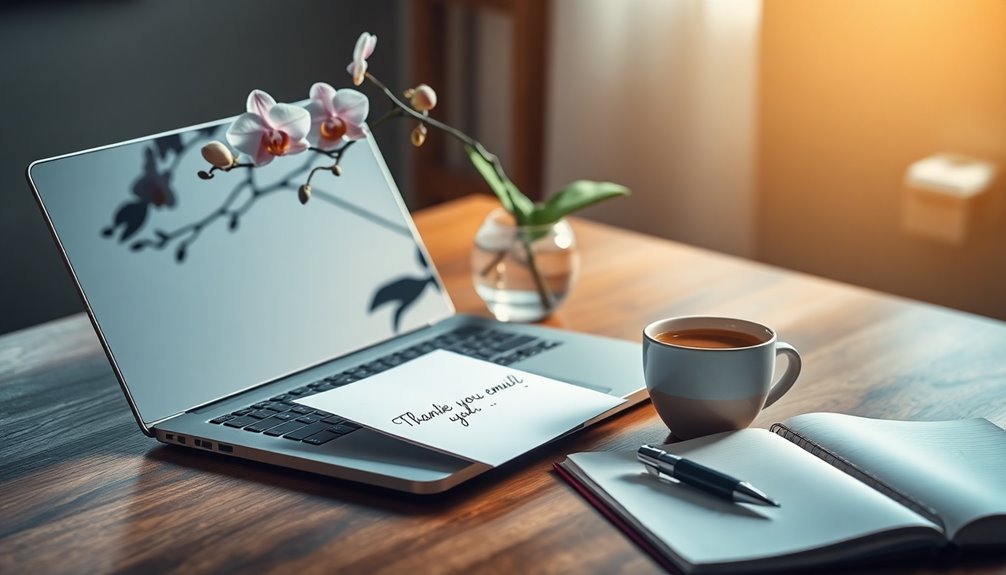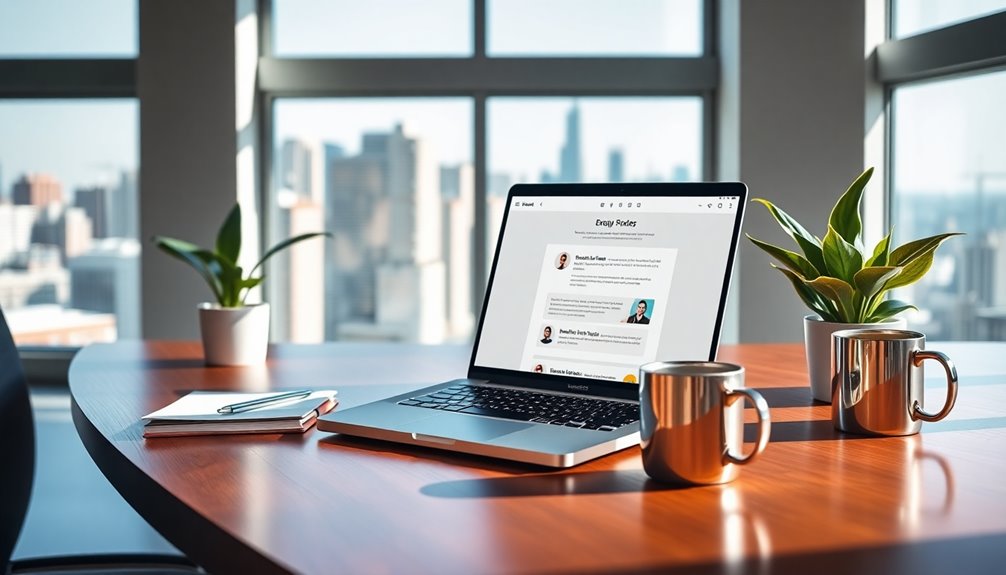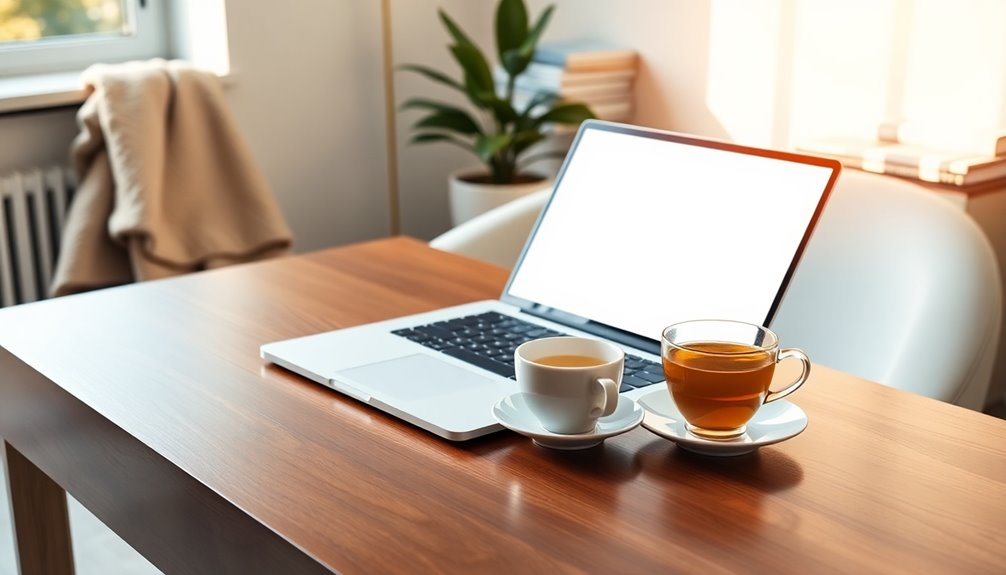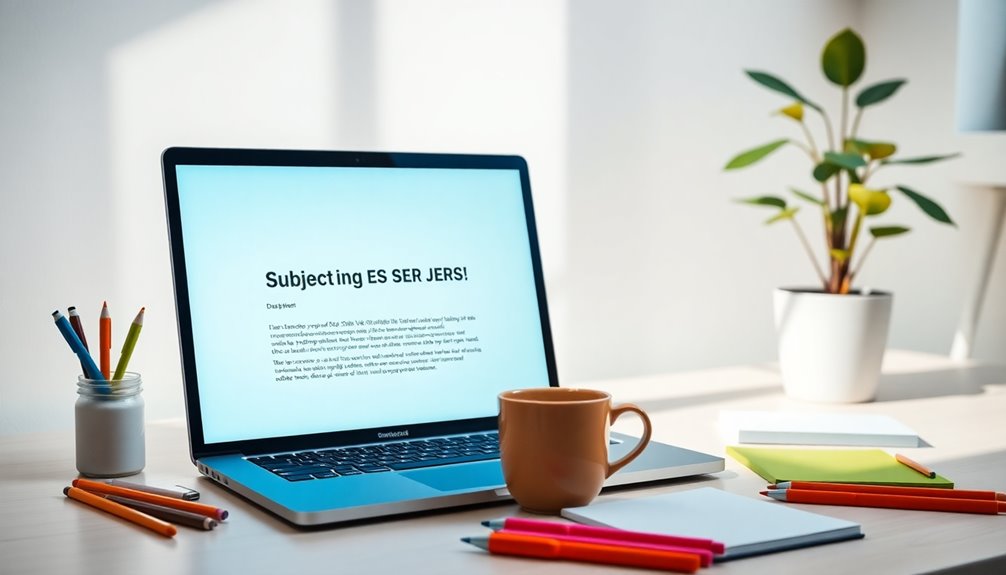To write a thank you email that leaves a lasting impression, send it within 24 hours of your interview. Start with a genuine expression of gratitude, and mention specific topics you discussed to personalize your message. Keep it concise—1-2 paragraphs are ideal—and highlight your qualifications relevant to the role. Use a clear subject line to ensure your email stands out. Remember to proofread to avoid any errors. This thoughtful approach not only reflects professionalism but also shows emotional intelligence. There's much more to explore on crafting the perfect message that can boost your chances.
Key Takeaways
- Send your thank you email within 24 hours post-interview to demonstrate enthusiasm and respect for the interviewer's time.
- Personalize your message by referencing specific topics discussed during the interview to strengthen your connection.
- Keep your email concise, ideally 1-2 paragraphs, focusing on gratitude and reiterating your qualifications for the role.
- Use a professional subject line and maintain a respectful tone throughout to enhance clarity and professionalism.
- End with a clear call to action, expressing your interest in further discussions and reinforcing your enthusiasm for the position.
Introduction
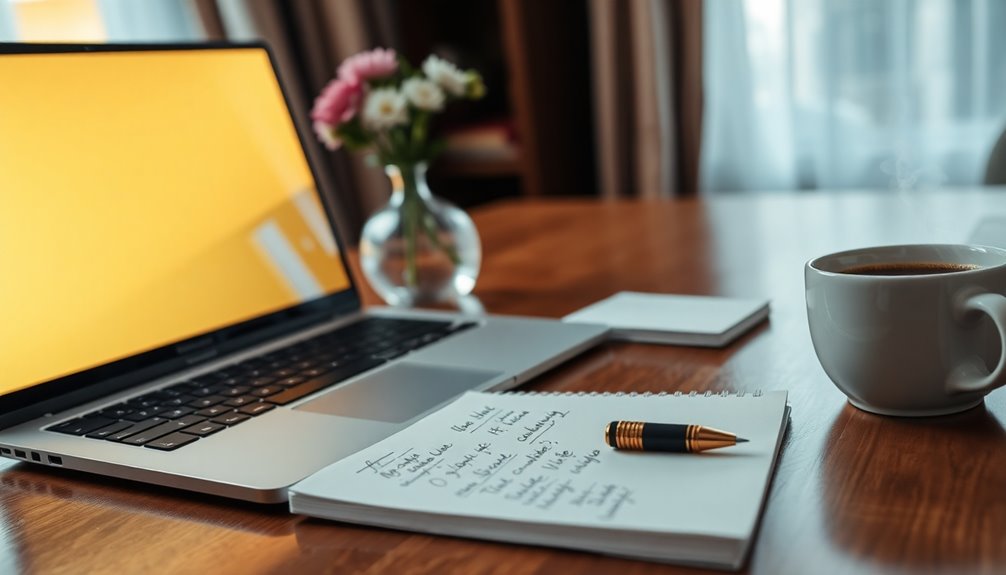
A thank you email is a vital tool in your job search arsenal. After your interview, it's essential to follow up promptly, ideally within 24 hours. This email not only allows you to express gratitude for the opportunity but also showcases your professionalism. By sending a well-crafted thank you message, you can leave a lasting positive impression on your interviewer.
To make your email stand out, personalize it. Address the interviewer by name and reference specific topics discussed during the interview. This connection reinforces your interest in the role and demonstrates that you were engaged throughout the conversation.
In addition, include a clear expression of gratitude and summarize key qualifications relevant to the position. A concise, focused message that highlights your personality while maintaining professionalism can significantly improve your chances of being remembered positively.
Don't forget to proofread your email for grammatical and spelling accuracy, as errors can undermine your professionalism. You might consider using an email template to help structure your message, but always ensure it feels authentic and tailored to your unique experience.
In short, a thoughtful thank you email can be a powerful asset in your job search.
Builds Professional Rapport Quickly
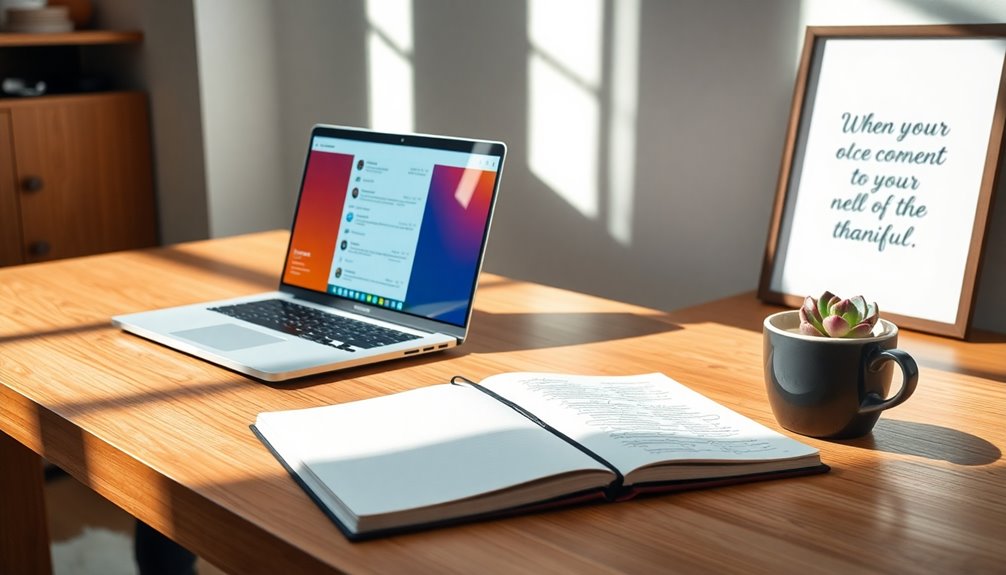
Sending a thank you email not only helps you express gratitude but also builds professional rapport quickly. By taking the time to craft a thoughtful message, you demonstrate your appreciation for the opportunity and the interviewer's insights.
Personalization is key; referencing specific details from your conversation shows attentiveness and strengthens your connection. When you express genuine enthusiasm for the role and the company, it reflects your alignment with the organization's culture and values, further enhancing rapport.
Make sure to follow up promptly, ideally within 24 hours. This signals professionalism and respect for the interviewer's time, reinforcing your interest in maintaining a relationship.
Including an invitation for future communication, such as asking questions or offering assistance, can foster an ongoing dialogue. This creates a space for continued engagement and connection, solidifying the professional rapport you've started to build.
Ultimately, a well-crafted thank you email not only leaves a lasting impression but also paves the way for future interactions, showing your commitment and enthusiasm for the role and the company. Conducting a thorough background check can also reflect your diligence and professionalism in the hiring process.
Personalized Subject Line
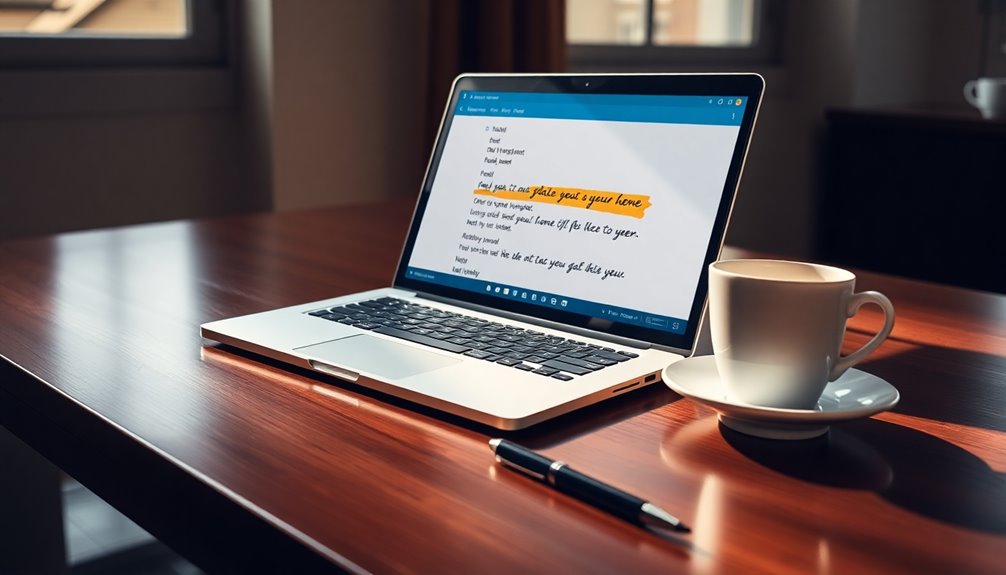
Crafting a personalized subject line can significantly increase the chances your thank you email gets noticed. By incorporating the recipient's name and the specific position or interaction, you create a connection that grabs attention and conveys relevance quickly.
Phrases like "Thank You from [Your Name] – [Position]" or "Grateful for the Opportunity to Interview" work well, as they enhance clarity and professionalism.
A personalized subject line not only captures interest but also demonstrates your attention to detail and genuine interest in the recipient. This simple yet effective approach can considerably increase open rates, especially among busy professionals who receive countless emails daily.
Including a specific detail related to your conversation or interview can further make your email stand out.
Aim for a concise subject line, ideally under 50 characters. This ensures it displays fully in email previews and is easy to read on mobile devices.
A clear and professional subject line sets the tone for your thank you email, making it more likely to be opened and appreciated. So, take the time to personalize your subject line—it's a small effort that can lead to significant impact.
Crafting a Compelling Subject Line

Grabbing attention with a compelling subject line is essential for ensuring your thank you email stands out. Start by keeping your subject line concise, ideally between 6 to 10 words, making it easily readable in an inbox. Including "Thank You" right away conveys your intention and creates a sense of appreciation.
Personalizing the subject line can make a significant difference. Consider adding the recipient's name or the position you interviewed for. For instance, using a format like "Thank You from [Your Name] – [Position Name]" not only indicates the email's content but also helps it stand out in a crowded inbox. Additionally, using a professional tone can enhance the overall impact of your message.
Avoid vague or generic subject lines like "Follow-Up" or "Hello," as they lack clarity and may be overlooked. Instead, aim for a professional tone that reflects your gratitude while clearly communicating your intention.
Dos and Don'ts for Thank You Emails

When it comes to writing thank you emails, knowing the dos and don'ts can make all the difference in how your message is received.
First, always personalize your email. Address the interviewer by name and reference specific points from your conversation. This shows genuine interest and leaves a lasting impression. You should also express gratitude explicitly for the interviewer's time and insights; this demonstrates your professionalism.
Avoid using a generic template. Instead, craft a unique thank you email that reflects your appreciation and highlights your qualifications and enthusiasm for the role.
Timing is crucial, so make sure to send your email within 24 hours of the interview. This promptness keeps you fresh in the interviewer's mind.
Lastly, don't forget to proofread your email. A well-written email free from grammatical errors enhances your professional image and reinforces your attention to detail.
Examples of Thank You Emails
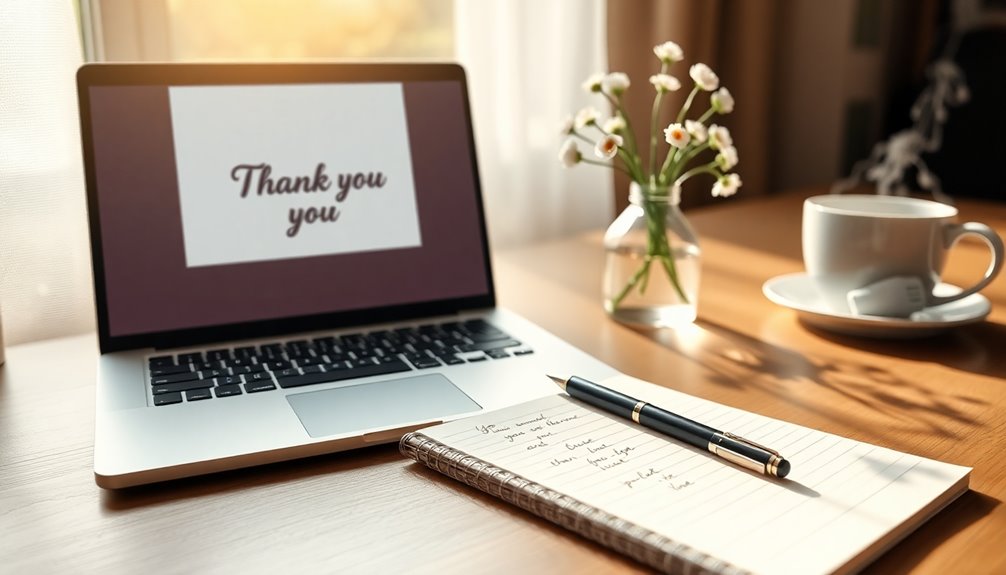
To make your thank you email stand out, consider using specific examples that reflect your conversation. In your well-crafted thank-you email, express your gratitude for the opportunity to interview for the position. For instance, you might say, "I appreciated our discussion about the team's innovative projects, especially how my skills in data analysis could contribute to your goals." This shows that you've taken the time to connect your specific skills with the role, reinforcing your qualifications.
Make sure to personalize the email by addressing the interviewer by name and mentioning relevant topics you discussed. A concise email, ideally one to two paragraphs, is essential so busy professionals can quickly grasp your message without feeling overwhelmed.
Use a clear subject line like "Thank You from [Your Name] – [Position]" to help your email stand out in their inbox.
Pro Tips for Writing Effective Emails
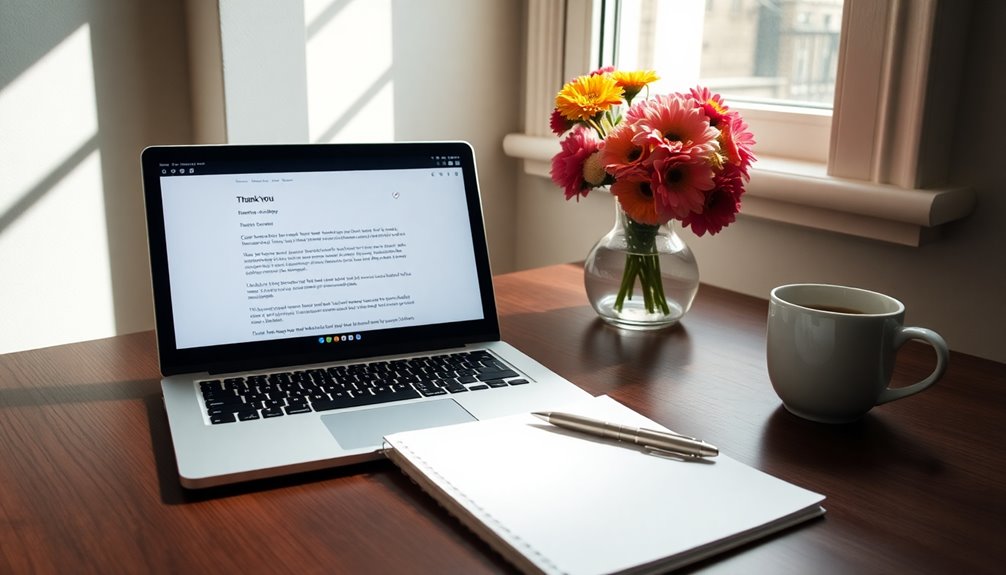
Crafting an effective thank you email goes beyond simply expressing gratitude; it's about making a lasting impression. Start by personalizing your thank you email. Address the interviewer by name and reference specific topics discussed during the interview. This approach helps create a memorable connection and shows you were engaged. Additionally, consider how your communication skills can positively impact future cooperative co-parenting plans if relevant, demonstrating your ability to collaborate effectively. In this context, showcasing your topical authority can further enhance your credibility and leave a strong impression. Establishing healthy boundaries in communication can also prevent misunderstandings and promote a respectful dialogue.
Keep your message concise—ideally, one to two paragraphs. In this space, express gratitude while highlighting your qualifications and interest in the role. A professional subject line that includes your name and the position will make it easy for the recipient to recognize the purpose of your email immediately.
Don't forget to send your thank you email within 24 hours of the interview. This demonstrates promptness, enthusiasm, and respect for the interviewer's time. Additionally, remember that emotional intelligence plays a crucial role in building strong connections, which can enhance your networking efforts beyond the interview.
Final Thoughts
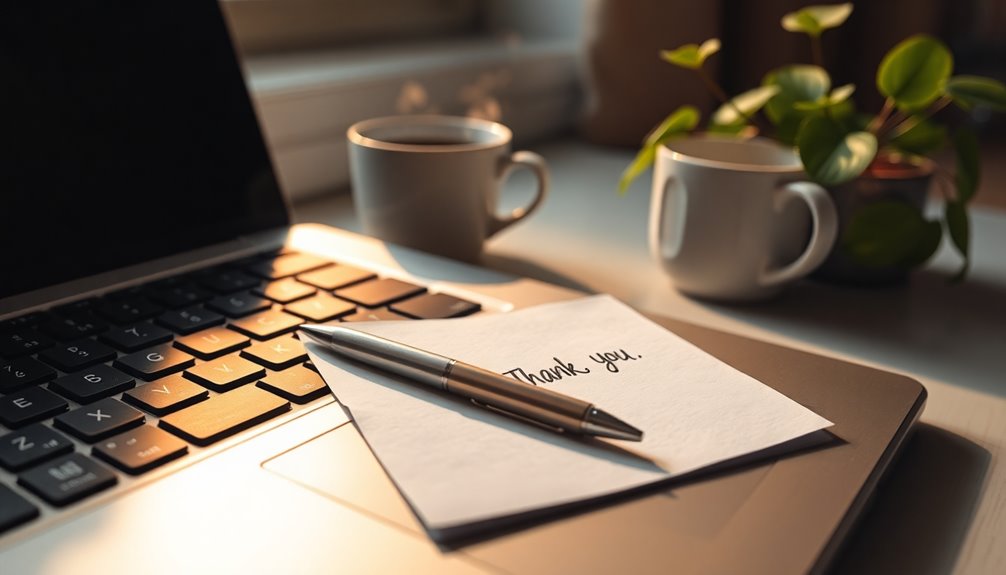
Wrapping up your thank you email effectively can make all the difference in leaving a positive impression. By expressing your gratitude within 24 hours of the interview, you demonstrate promptness and eagerness, key components of professional etiquette.
Personalizing your thank you email by referencing specific topics discussed during the interview not only reinforces your qualifications but also shows genuine interest in the role.
Keep your message concise and focused on gratitude; busy professionals appreciate brevity. A well-crafted thank you email can significantly enhance your chances of making a lasting impression, as studies show that 80% of hiring managers value these communications.
Don't forget to include a clear call to action. Inviting further conversation can help maintain engagement and potentially open doors for future interactions.
Frequently Asked Questions
How Do You Express Gratitude in a Professional Email?
To express gratitude in a professional email, start with a personalized greeting, using the recipient's name.
Clearly state what you're thankful for, mentioning specific actions they took that made an impact on you.
Reflect on key points from your interaction to show you were attentive.
Keep your tone respectful and professional, and wrap up by inviting future communication.
This approach not only conveys your appreciation but also fosters ongoing collaboration.
How Do You Write a Thank You Email Professionally?
To write a professional thank you email, start with a clear subject line that includes your name and the position. To write a professional thank you email, start with a clear subject line that includes your name and the position. Express your gratitude in the opening sentence and reference specific details from your interaction or interview. If appropriate, gracefully mention any additional requests, such as asking the recipient to “write email for recommendation letter” to further support your future endeavors. Conclude the email with a polite closing and your contact information to ensure seamless communication.
Address the interviewer by name and express your appreciation for their time. Reference specific topics from your conversation to show attentiveness and reinforce your fit for the role.
Keep the email concise, ideally one to two paragraphs, and proofread for any errors before sending to ensure professionalism and attention to detail.
How Do You End a Professional Email Thank You?
To end a professional thank you email, you should include a polite closing statement that reinforces your appreciation.
You might say something like, "Thank you once again for your time and consideration."
Express your eagerness to continue the conversation, such as, "I look forward to speaking again soon."
How to Write a Professional Thank You Email After Resignation?
To write a professional thank you email after your resignation, start by expressing genuine gratitude for your experiences.
Address your direct supervisor, keep a respectful tone, and mention specific skills or opportunities you appreciated.
Offer your assistance during the transition, whether it's training your replacement or helping with handovers.
Keep it concise, ideally a few short paragraphs, and send it within a few days of resigning to reinforce your professionalism.
